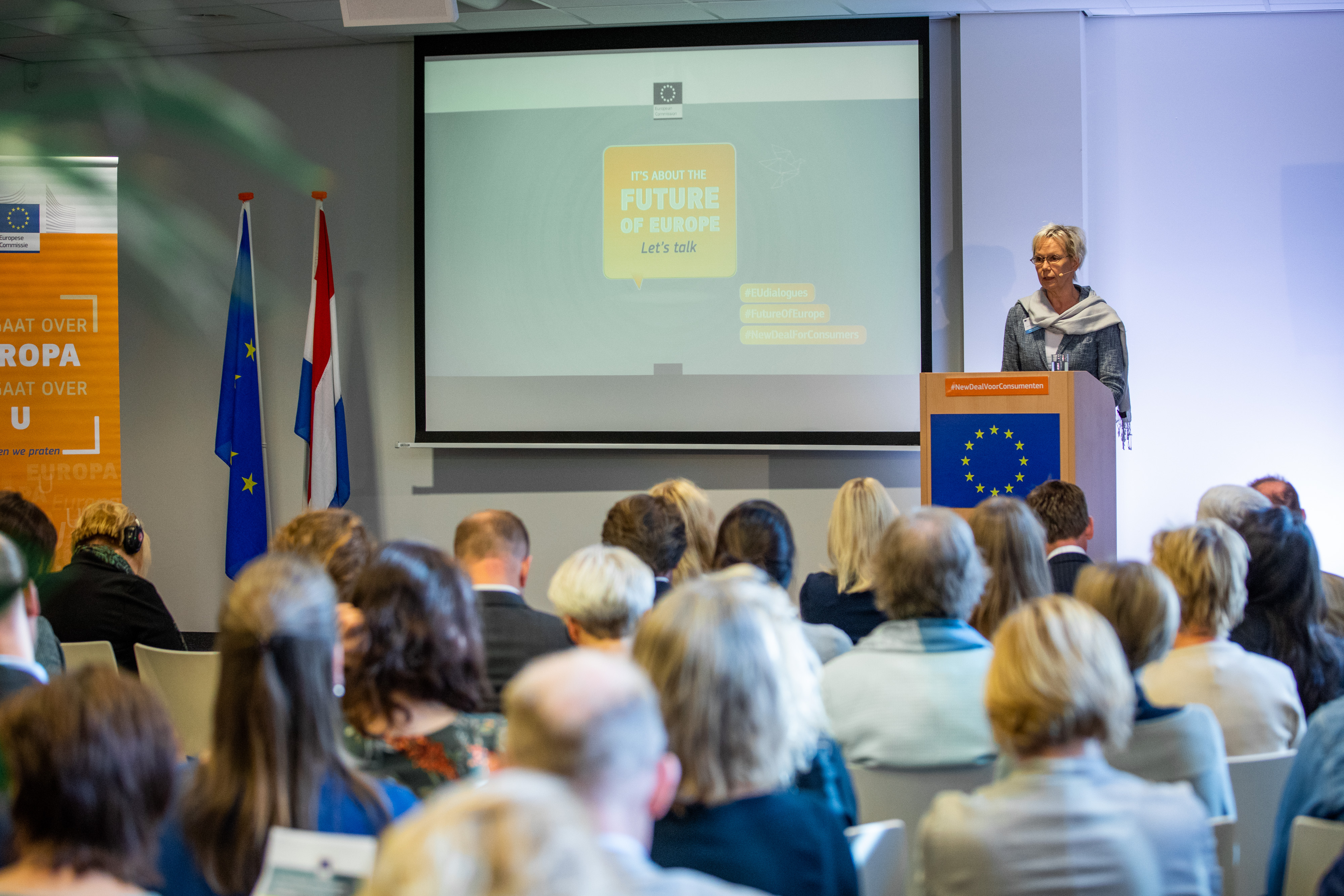"New Deal for Consumers needs to be a team effort", says Dutch State Secretary of Economic Affairs

Related topics
Consumer policydate: 09/10/2018
One of the keynote speakers at the event in Europe House, Tiina Astola, the EU's Director-General for Justice and Consumers, outlined the objectives of the New Deal package and reiterated that while Europe has some of the world's strongest consumer protection rules, there needs to be improvements.
"This package aims at modernising some consumer rules to bring them in line with market developments, but also the idea is to reduce disproportionate burdens on traders."
Two weeks ago, at a dialogue in Vienna, Věra Jourová, the European Commissioner for Justice, Consumers and Gender Equality said she was prompted to act when the Commission realised that consumers in the US had been compensated in the Diesel gate case, while European consumers were not.
The Volkswagen emissions scandal began in September 2015, when the United States Environmental Protection Agency (EPA) issued a notice of violation of the Clean Air Act to German automaker Volkswagen Group. The agency had found that Volkswagen had intentionally programmed turbocharged direct injection (TDI) diesel engines to activate their emissions controls only during laboratory emissions testing which caused the vehicles' NOx output to meet US standards during regulatory testing, but emit up to 40 times more NOx in real-world driving.
Since starting its term in 2014, the current Commission has placed consumer issues at the top of its agenda. One of its most impactful achievements was to bring an end to mobile roaming charges last year.
However, Ms Astola also warned about the dangers of trying to do too much and said the plan is for the EU to intervene only where it's necessary.
"In the Commission we really think it's important to avoid overregulation," Ms Astola said. "In Finland we were always told the story of the cucumbers that weren’t straight and I was always faced with this age-old urban legend. It is important that we are not seen as overregulating."
The New Deal for Consumers includes two different proposals. The so-called Omnibus proposal targets amendments to four different directives: unfair commercial practices directive, consumer rights directive, unfair contract terms directives and the price indication directive. The second proposal is about representative actions which replaces the injunctions directive.
Consumer rights in The Netherlands are well protected by both Dutch legislation and transcribed EU Directives. They include most and all rights one would reasonably expect to have regarding faulty products, sales scams, and returns.
Mona Keijzer, the Dutch State Secretary of Economic Affairs and Climate Policy, expressed her government's support for the New Deal, reminding those in the audience that most of the consumer protection rules have been initiated by the European Union. At the dialogue a small poll was conducted among those present, which revealed overwhelming support for the Commission's collective redress provision.
"We need to work together to strengthen consumer rules because that's what has worked historically," Ms Keijzer said. "If we all keep on discussing things at the European level and at the national level, with traders, with consumers, we will be able to put a proper policy in place." The State Secretary also took the opportunity to demonstrate this in practice by launching the new Consumer Agenda of the Dutch Government on the same day as the event, tackling the problems of online sales and aggressive telemarketing in the Netherlands.
Digital platforms, privacy and telemarketing were topics which received the most attention.
Bart Combée, Director of the Consumentenbond, expressed how intrusive to people's lives telemarketing can be and that further legislation to curb the practice would be welcome.
"You are having a family dinner and there is a company calling you and don't really want to know that they are disturbing, so that's extremely annoying," Mr Combée said. "But we need to be careful because if you stop one unfair practice then another one like aggressive door-to-door selling might become more prominent."
Marie-Paule Benassi, Acting Director for Consumers at the European Commission called for balance and to avoid the impulse of banning things outright.
"The question is to ensure you have a system that's balanced, and which permits communication by phone. What I can say is that it will be extremely difficult to enforce legislation against unsolicited communication, as it is already very difficult to enforce marketing and sales practices using doorstep selling," Ms Benassi said.
Cateautje Hijmans van den Bergh, Member of the Board at the Authority for Consumers & Markets, said online transparency remains an issue and that more conversations need to be had with industry leaders on consumer behaviour.
"As consumers we are quite predictable," Ms den Bergh said. "We tend to go for the first or middle option in our search results so we need to make sure these platforms are acting in the best interest of consumers and not harming them."
As the Consumer Dialogues travel outside of the Brussels bubble over the coming months, preparations are being made for a November 28 meeting of all Member States in Brussels.
The goal is to iron out any differences of opinion on the package before it moves on to the final negotiations in the European Council and European Parliament.
